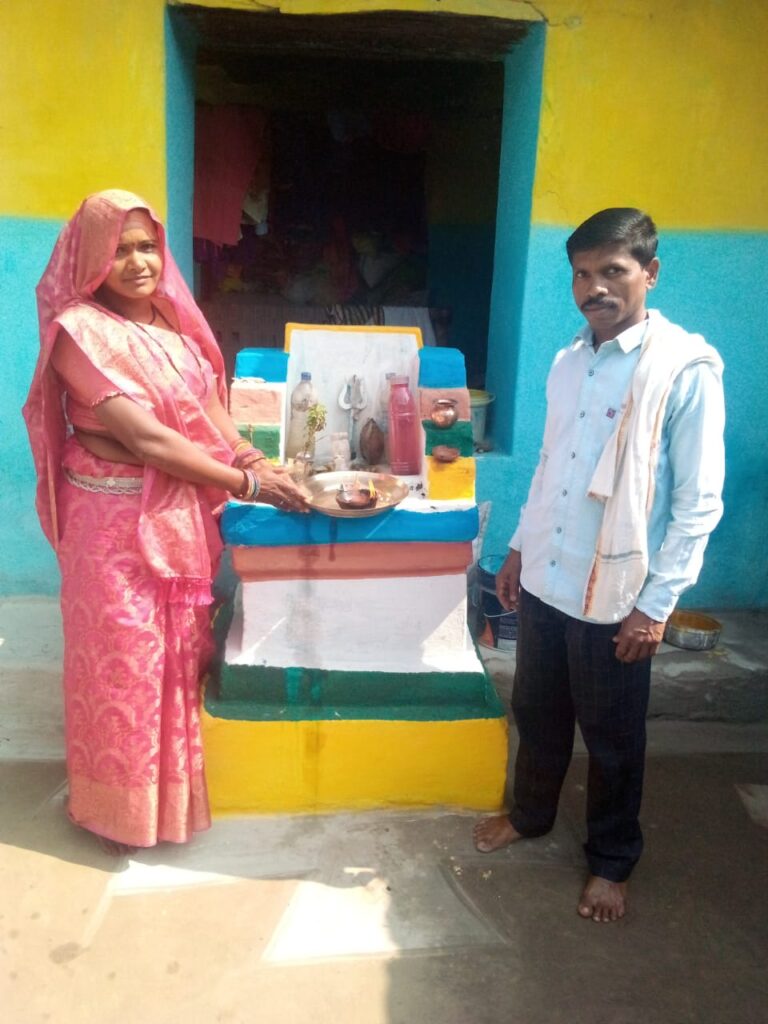The rhythmic rumble of the Bolero filled the air as I sat at the backseat, lost in thought. Just an hour ago, we’d been huddled together, pouring over maps and plans. Now, as we journeyed from the dusty roads of Kurkheda, Maharashtra, towards the bustling city of Nagpur, my mind drifted back to our strategies. Beside me, Sunita, my trusted community resource person from the quaint village of Majhauli Kalan in Madhya Pradesh, was a quiet companion. Her presence, a constant reminder of the work that lay ahead, grounded me. Together, we were more than just colleagues; we were a team, united by a common goal.
Sunita, a woman of thirty-five summers, bore the marks of time, gracefully. Her dusky skin was etched with delicate lines, a testament to years of laughter and worry. Her eyes, a deep, rich brown, sparkled with a warmth that belied her age. Framed by thin, arched eyebrows, they held a world of stories. Her nose, small and button-like, added a touch of charm to her face. Her medium-sized, brownish lips, often curved in a gentle smile, were adorned with a touch of red vermilion, a symbol of her married status. A red bindi, a vibrant dot on her forehead, completed her traditional Indian look.
Conversation
“Do you have a clear plan for your village now?” I asked her, curious about the spark I’d ignited.
“Yes, I do,” she replied, a newfound determination glinting in her eyes. “I’ll strive to uplift the women in my village. But I know I can only help those who are willing to help themselves. Those who truly yearn for change will step forward. Those who are content with their current situation, unfortunately, won’t lift a finger.” I nodded, a deep sigh escaping my lips. She paused, lost in thought. “Sometimes,” she began, her voice heavy, “It’s not even our fault. The authorities, the ones who should be providing us with government benefits, lack the integrity to do so. They don’t bother explaining why our applications are rejected, and the innocent villagers don’t know how to fight for their rights.”
Intrigued by the somber tone in her voice, I couldn’t help but ask, “Has something like this happened to you personally?” She nodded, a flicker of pain in her eyes. “Yes,” she confessed, “when I was applying for the Ladli Behena Yojana, I faced significant hurdles. It was only through sheer determination that I was able to complete the application process.”
“Sah Rojgar Sachiv, the government official in charge of employment schemes, is supposed to help us with these applications,” Sunita explained. “His office is a long 25 kilometers away from my village. When I submitted my application for the Ladli Behena Yojana 15 days before the deadline, he rejected it without even informing me. It was only two days before the deadline that he called me mentioning the rejection, crushing my hopes of availing the scheme.”
A Baffling Rejection
Sunita was baffled. Why had her application been rejected when her relatives had successfully availed the scheme? Determined to find answers, she and her husband embarked on a 25-kilometer journey to the Sah Rozgar Sachiv’s office in Ataria village. With the deadline looming, the office was a hive of activity. A long queue of women, each with their own hopes and dreams, snaked outside the door. Disheartened, Sunita wondered if she would even get a chance to speak to the official. But as luck would have it, she was the daughter-in-law of the village Sarpanch. Recognizing her, the other women graciously made her way, allowing her to step into the tiny, cluttered office cabin.
The official, harried and overwhelmed, asked Sunita what her problem was. She explained the rejection of her application and her confusion about the reason. He requested her details, punched them into the slow, sluggish system, and finally pulled up her application. As the minutes ticked by, it became clear that the afternoon was slipping away. When he finally looked at her application, he delivered the shocking news: her application was rejected because she was unmarried.
Sunita was stunned. “I’m married!” she exclaimed, pointing to the vermilion mark on her forehead. “Are you blind? How can you say I am unmarried?”
The Reluctant Fix
The official was taken aback by Sunita’s outburst. He knew she was married, and the excuse he’d given was a flimsy attempt to cover up his mistake. Regaining her composure, Sunita demanded, “What’s the problem? Why is it showing that I’m unmarried, and how can I fix this?”
Sachiv, the official, sighed, his expression a mix of resignation and irritation. He directed her to the Aadhaar and Samagra ID office in Bilaspur block, a daunting 15 kilometers away. With a heavy heart, Sunita embarked on this arduous journey. At the office, she presented her documents to the person in charge of edits. Hours ticked by, a seemingly endless wait.
Finally, the official gave a weary thumbs-up, signalling the correction of her marital status. A wry smile crept across Sunita’s face. She quipped, “Kya ab humari shaadi ho gayi hai (are we married now)?” The room erupted in laughter, the tension breaking into a moment of levity. The official, blushing, sheepishly confirmed, “Yes, you are, at least on official documents.”

An Ordeal
The ordeal had taken its toll. As the sun began its descent, Sunita emerged from the office, exhausted and famished. Yet, she pressed on, determined to reach the Sah Rozgar Sachiv before his office closed at 8PM. At long last, she arrived, breathless but resolute. The Rozgar Sachiv, fortunately, was still there, and she was able to submit her application. It was a hard-earned victory and a testament to her unwavering dedication and determination.
Sunita’s journey had been a marathon of perseverance. She had skipped meals, borne the cost of travel, and returned home at the stroke of midnight. Yet, her spirit remained unbroken. It was her unwavering dedication and relentless pursuit of answers that had finally secured her the benefits of the government scheme. Her story, a testament to the power of human spirit, echoed through the quiet corridors of bureaucracy.
But is this alright with us that she had to undergo this?




0 Comments